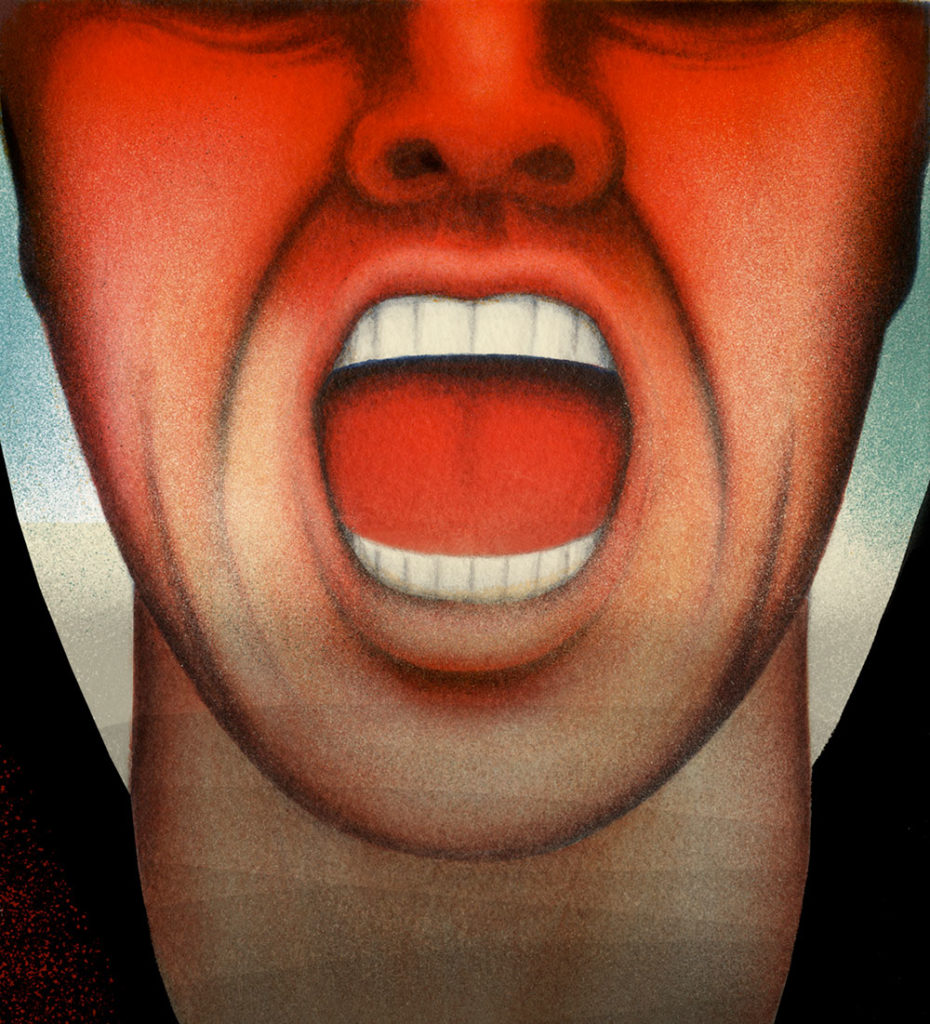
Brendan Busse, S.J., writes about anger in our series on The Seven Deadly Sins.—The Editor
I was recently sorting through old files and came across a letter my father had written while I was away on a weeklong retreat in high school. Complimenting my tolerance of some of the craziness in our family, he wrote, “I’ve never once heard you use the word hate; I have never seen you express rage.” He was probably right. Those who know me would not likely put anger on the list of my weaknesses. People tell me that I have a peaceful presence. My mother refers to me as her Buddha-baby. And yet, while I may not be taken to expressions of rage, it would be wrong to say that I know nothing of anger, that I’ve never suffered its effects or never been guilty of it myself.
Not long before receiving that letter, I was riding to school with a couple of friends listening to a song called “Freedom,” by a band called Rage Against the Machine (the things you do as a teenager). It was an early morning, we had the volume turned up adolescently high, and I noticed for the first time a whispered lyric that appears quietly during a short break in the bridge: “Anger is a gift.” Hearing that line at that particular moment in life felt like a revelation. It made all the sense in the world to me. I knew it to be true. And, like any real revelation, I also knew it to be dangerous.
A couple of years earlier, I came home from school and learned the city was in flames. I turned on the TV expecting the usual afternoon sitcoms and found instead every channel streaming aerial footage of looting, shop owners with shotguns, buildings on fire. At first the riot seemed righteous — that is, right in the way in which it revealed the truth of something very wrong. But righteousness never survives for long after the turn to violence, after that moment when our anger wants not for justice but for vengeance, not for right but for wrath.
After months of watching a sickening video of a gang of white cops brutally beating a black man, now I watched live as another gang brutally beat a white truck driver. In both cases, the thing that struck me was how people acted as if they were right in their violence. The gift of anger when turned to the sin of wrath leads us to seek the suffering of others and sometimes even to enjoy it. I can’t say I understood any of this at the time. All I know is that I felt sick at the sight of it and went searching again for the gift of anger. I remember closing the door to my room and taking a baseball bat to my mattress, hitting as hard as I could the only thing around capable of accepting my frustration without consequence.
Anger is a gift when it shows up as righteousness — returning the wronged to their rights. But anger is a curse when it turns to wrath, when it bends the truth of righteousness toward control or domination. When it turns to boot or billy club, bullet or brick, merciless anger refuses the gift of liberation and robs us, and others, of freedom and life.
There are plenty of things worthy of righteous anger in this world of ours. And plenty of need for the action for justice such anger can inspire. If anger truly is a gift, it belongs to God. So I say, let him have it. And then we can turn again to the long work of making this world a place where it is easier for us to love.
Brendan Busse, S.J. ’99 was ordained on June 10, 2017, and missioned to work at Dolores Mission Church in Los Angeles. He is a contributing writer for America Magazine, the weekly Jesuit magazine, and he formerly was a writer and editor at The Jesuit Post.org.
More on The Seven Deadly Sins
Sloth
Words by Susan Straight
Illustration by Sandra Dionisi
Envy
Words by Lynell George ’84
Illustration by Marc Burckhardt
Lust
Words by Denise Hamilton ’81
Illustration by Jason Holley
Greed
Words by P-’Dre Heresy
Illustration by Marc Burckhardt
Gluttony
Words by Oliver de la Paz ’94
Illustration by Marc Burckhardt
Pride
Words by Jason S. Sexton
Illustration by Sandra Dionisi
Exit Lighting
By Editor Joseph Wakelee-Lynch
Return to Virtue Reality by David A. Sánchez
